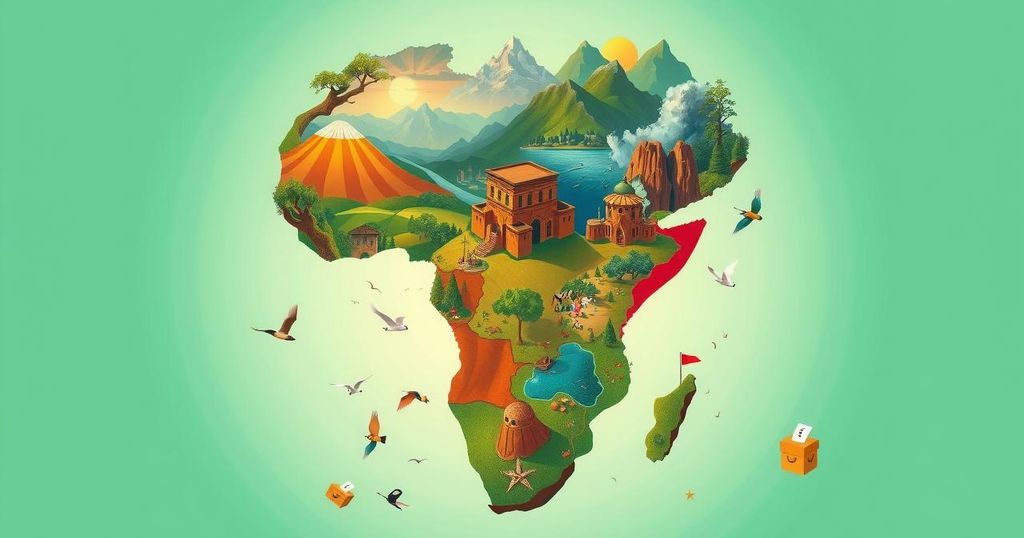Overview of Significant Elections Scheduled in Africa for 2025

The year 2025 will witness significant elections across Africa, including nine presidential races, seven legislative contests, and multiple local elections, shaping the continent’s political future. Key countries include Gabon, Burundi, Malawi, Seychelles, Guinea, Cameroon, Ivory Coast, Tanzania, Guinea-Bissau, the Central African Republic, Togo, and Comoros, each with unique electoral contexts and leadership dynamics.
In Africa, the year 2025 is set to host critical elections that will significantly impact the political landscape across various nations. The continent will see at least nine presidential elections, alongside seven legislative, two senatorial, two municipal elections, and two referendums. The following is an overview of notable elections scheduled for this year.
Gabon is preparing for its presidential elections on April 12, 2025, after a recent referendum ratified a new constitution. This follows a military coup in August 2023 that saw General Brice Oligui Nguema ascend as transitional president, who is anticipated to contest in the upcoming elections.
Burundi will conduct legislative elections on June 5 and senatorial elections on July 23. The current majority party in the National Assembly is the ruling CNDD-FDD, overseen by President Evariste Ndayishimiye since 2020, governing a nation of 13.5 million.
Malawi will hold both presidential and legislative elections on September 16, with approximately 2.5 million eligible voters out of 21.7 million citizens. President Lazarus Chakwera, in office since 2020, is expected to seek re-election against a backdrop of a divided National Assembly.
Seychelles’ elections will occur on September 27, where President Wavel Ramkalawan will vie for a new term, following the dissolution of an incumbent-led legislature. The island nation has 56,730 registered voters within its nearly 100,000 person population.
Guinea plans to transition back to a constitutional government by late 2025, involving a referendum and general elections. Transitional President Mamadi Doumbouya, who came to power via a coup in 2021, aims to introduce a new constitution following a phased electoral process.
Cameroon is scheduled for presidential elections in October 2025, where incumbent President Paul Biya, who has held power since 1982, will seek re-election among ten other challengers. The country’s electorate numbered over 7.8 million in the last elections.
Ivory Coast will also hold presidential elections in October, with President Alassane Ouattara indicating intentions to run for a fourth term. Competing candidates may include prominent figures such as former Prime Minister Pascal Affi N’Guessan.
Tanzania, led by President Samia Suluhu Hassan since 2021, will participate in the presidential elections scheduled for October, following a significant leadership change after the previous president’s death.
Guinea-Bissau is slated for simultaneous presidential and legislative elections to occur between October 23 and November 25, currently heading by President Umaro Sissoco Embalo since 2020, with recent assembly elections held in 2023.
The Central African Republic will hold presidential elections in December, with uncertain candidacies surrounding President Faustin-Archange Touadera, who has served since 2016 amidst potential challengers.
Togo is preparing for its inaugural senatorial elections on February 15, following a shift to a parliamentary system. The Senate will comprise elected and appointed officials under President Faure Gnassingbe’s leadership, established since 2005.
Lastly, Comoros held the first elections of 2025 on January 12 for its National Assembly, with a second legislative round scheduled for February 16. The ruling CRC party dominated this initial election, overcoming opposition challenges across several constituencies.
The upcoming elections in Africa represent a pivotal moment for the continent’s democratic landscape and governance structures. They present an opportunity for nations to express their political aspirations and influence both domestic and international discourse. These elections are particularly noteworthy due to their implications for political stability, governance reform, and the potential for improved representation within parliamentary systems.
In summary, the year 2025 is shaping up to be a historic electoral year for numerous African nations, with an array of elections set to take place. These key elections will not only shape each country’s political future but also have broader implications for governance and democracy throughout the continent. As voters prepare to make their voices heard, the outcomes will be closely monitored by both local and international observers.
Original Source: www.aa.com.tr







